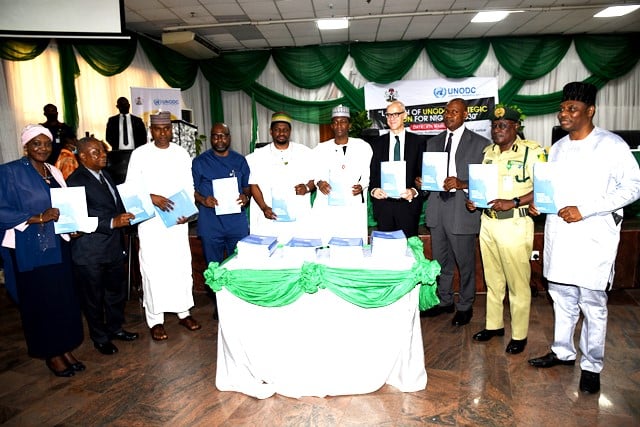“Our Vision 2030 focuses on five priority areas, to enhance the ability of the Criminal Justice System to uphold the Rule of Law, Safeguard people, institutions and economy from Corruption and illicit financial flows, Securing the safety of people from terrorism and violent extremism, Protecting people, Economy and the Environment against organised crime, Promoting people’s health through drugs and HIV/AIDS prevention, treatment and care”.
This was revealed by the Nigeria Government at the Launch of the United Nations Office on Drug and Crime (UNODC) strategic Vision for Nigeria 2030, on Friday, 4th March, 2022 at Obasanjo Auditorium in Abuja.
In his Keynote Address, the Honourable Attorney General of Federation and Minister of Justice (HAGF) Abubakar Malami SAN, represented by the Acting Solicitor General of the Federation and Permanent Secretary, Benjamin Okolo Esq. said, the Strategic Vision for Nigeria 2030 will help Nigeria in achieving the Sustainable Development Goals (SDGs) particularly SDG 16 aimed at promoting peaceful inclusive societies for sustainable development and providing access to justice institutions at all levels.
Malami assured the Organisation of the Federal Government’s continuous support and cooperation in the implementation of the Strategic Vision.
Earlier in her welcome address, Head, Asset Recovery and Management Unit, Federal Ministry of Justice Ladidi Bara’atu Mohammed said, last year UNODC launched the Strategic Vision for Africa 2030 but today’s launching of the Strategic Vision for Nigeria is based on the collaborative of what they had and the activities being conducted in Nigeria.
In his remarks, the UNODC Country Representative, Nigeria, Mr. Oliver Stolpe explained that, the Strategic Vision for Nigeria was the latest result of a strong and long-standing partnership with Nigeria since 1990, so it is time to elevate the partnership, to confront growing challenges by building on the positive steps that have been taken.
He added that, Nigeria faces serious, multi-dimensional challenges to security and rule of law, Boko Haram and other Terrorist groups target innocent people in the North- East and across the Sahel, while piracy continue to plague the Gulf of Guinea.
In order to address this situation in a sustainable way, Stolpe explained that it is critical to strengthen the broad framework of responses, including laws, Institutions, capacities and awareness of which Nigeria has already taken significant steps but needs a robust legal frame work to tackle serious and organised crime such as drug trafficking, terrorism, piracy, trafficking in persons, corruption and money laundering.
Enumerating on the achievements of UNODC through the partnership with Nigeria on all these challenges, Mr Stolpe said it is time to give even greater structure, momentum and impact to the Organisation’s efforts. Hence the Launch of the UNODC Strategic Vision for Nigeria 2030
In his goodwill message Chairman, Economic and Financial Crimes Commission (EFCC), Abdulrasheed Bawa said that, as a signatory to the United Nations Convention Against Corruption (UNCAC), the United Nations Convention against Transnational Organized Crime (UNTOC), as well as other related United Nations treaties, Nigeria has always remained committed to eradicating crime and criminality through the support of UNODC programmes, Projects and activities.
“Thus, our gathering here today to officially unveil the Strategic Vision for Nigeria 2030 is but a continuation of the existing collaboration in strengthening multilateral relations and enhancing the global fight against all forms of crime, Bawa further said”.
He noted that the five priority areas identified in the Strategic Vision in consultation with the Nigerian Government and other stakeholders, are aligned to the Sustainable Development Goals and the five EFCC Strategic Objectives outlined in the Commission’s Strategic Plan 2021-2025.
While delivering his goodwill message, Chairman, Independent Corrupt Practices and Other Related Offences Commission (ICPC) Professor Bolaji Owasanoye explained that it has been much on theory than in practice and this is not due to the fault of the developed world alone but also due to developing as well.
Director Public Prosecution of the Federation, Mr. Mohammed Babadoko Abubakar while thanking the UNODC and Development Partners, pointed that the vision would help in attaining the development goals as a nation.
In attendance were representatives of Director-General, National Drug Law Enforcement Agency (NDLEA), FCT High Court Judge, Nigerian Correctional Centre, and Commissioners from ECOWAS, Directors from Ministries, Departments and Agencies, Diplomats and amongst others.


